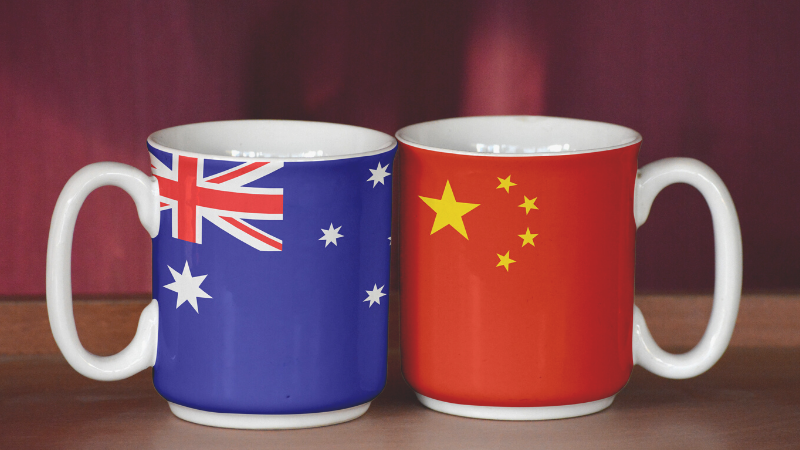Perspectives: Be careful what you wish for: the risks of taking a punt on the pathway of US-PRC strategic competition
March 04 2021

Perspectives is UTS:ACRI's monthly commentary series, featuring a piece on a topical subject in the Australia-China relationship from an invited expert contributor.
Early signals from President Joe Biden’s administration about its approach to US-PRC relations indicate the competitive and adversarial trajectory established under his predecessor will likely intensify.
Biden has asserted that US-PRC relations will be defined by ‘extreme competition’. The President and his Secretary of State Anthony Blinken have sparred with their PRC counterparts on the PRC’s ‘unfair’ economic practices, repression in Hong Kong and Xinjiang, and its ‘regional assertiveness’. And Biden has proclaimed that ‘America is back’ and will work with allies and partners around the world ‘to secure the peace and defend our shared values and advance our prosperity’.
These signals have largely been welcomed in Australia, partly because they demonstrate the administration’s recommitment to American leadership in the region, especially after the Trump administration’s chaotic ‘America First’ posture. But they also confirm Biden accepts that ‘the optimistic assumptions underpinning the four-decade-long strategy of diplomatic and economic engagement with China have failed’.
Some even argue that Biden’s notion of ‘extreme competition’ is a hopeful sign that his administration may ‘show a capacity for positive risk-taking through big new moves with US partners like Australia’. The underlying assumption here is that ‘extreme competition’ between Beijing and Washington will be to Australia’s benefit.
But this thinking is badly flawed on a number of levels. The central error made by those who see ‘extreme competition’ as a good thing for Australia is to assume that this implies an American strategy that is automatically conducive to our interests.
Strategically, embracing US-PRC competition constrains Australia’s choices and opens up the potential for Canberra to be held hostage to decisions about managing that competition that will be made in Washington and Beijing, and which provide no assurance that Australian preferences will be upheld. Politically, while some have celebrated Australia’s role as a ‘first mover’ in ‘pushing back’ against PRC interference and coercive diplomacy, our societal cohesion has already been damaged by the securitisation of values and identity that this process has engendered.
This speaks to a bigger problem in Australian strategic policy: the assumption that given its relative power and geographic position, the most effective way to protect and advance Australia’s interests and security is through its alliance with the United States. That assumption worked when America was the pre-eminent power in Asia, and committed to tending the region’s institutional architecture. But over the past decade that position has been challenged, not just by an assertive PRC but also by the strategic introversion espoused by the Obama and Trump administrations.
As Georgetown University Professor Dan Nexon has pointed out, there is ‘no single grand strategy for eras of great-power competition’ and ‘no instruments of statecraft that competition renders relevant or irrelevant’. Crucially, such competition might require ‘strategic retrenchment, or offshore balancing, or deep engagement’, and the ultimate choice a great power such as the United States makes will be determined by its own interests, not the PRC’s or Australia’s.
Here, we need to recognise that much of the American strategic community has identified that regaining the US military and economic ‘competitive edge’ with the PRC is a central priority. But that means, as Boston University Assistant Professor Joshua Shifrinson argues, ‘the foundations of US strength—something separate from US interests—are under duress, requiring competition to reverse the trends. By this logic, only relative American advantages will produce security, and losing the lead will compromise US interests’.
Thus while the Biden administration has rhetorically committed to the traditional type of American grand strategy that Canberra finds attractive – i.e., continued forward deployed military presence, continued investment in its alliance relationships and (re)commitment to a ‘liberal international order’ – it is likely to be preoccupied with strengthening the military-economic bases of American power rather than on sustaining the extant international order or protecting US alliances.
That means the United States has much less margin for error in its strategic competition with Beijing. The central dilemma for the Biden administration is one all hegemonic states face at some point: choosing ‘between buying military security, at a time of real or perceived danger’, which then becomes a ‘burden upon the national economy’; or keeping such security commitments low ‘but finding one’s interests…threatened by the actions of other states’.
Although betting on the United States buying security to regain the military and economic predominance it enjoyed in the post-Cold War ‘unipolar’ decade is not necessarily a long shot, it is also not as sure a thing as some Australian commentators presume.
Indeed, the hegemonic dilemma may become especially acute given the considerable domestic challenges facing the US. These include the economic and social costs of COVID-19, reanimated race and class divisions, a crisis of democracy, sharp partisan divides on American foreign policy, and the lack of real alternatives to a trading relationship with the PRC that de facto gives it substantial influence over US choices.
And while there are political and psychological incentives for the Biden administration to ‘get tougher’ on the PRC, a scenario that is just as plausible is something akin to détente. Biden – like President Richard Nixon in 1968 – faces the challenges of revitalising a tarnished image abroad, an assertive peer competitor and profound socio-economic divisions at home. Nixon’s response – détente – attempted to both engage and compete with the Soviet Union by undertaking a form of offshore balancing and a focus on leveraging American diplomatic and technological advantages.
Despite being caricatured by domestic opponents that it was too passive, détente was a competitive strategy designed ‘to find a new global equilibrium that would reflect the changing nature of international relations without jeopardizing the United States’ preponderant influence around the globe’, and ultimately aimed at avoiding war with the Soviet Union.
In 2020, two key Biden administration officials (National Security Council Co-ordinator for the Indo-Pacific Kurt M. Campbell, and National Security Advisor Jake Sullivan), sketched a similar approach for managing US-PRC relations. They noted that American strategy toward Beijing should ‘seek to achieve not a definitive end state akin to the Cold War's ultimate conclusion’ but ‘a steady state of clear-eyed coexistence on terms favorable to U.S. interests and values’. Such ‘coexistence’, they continued, ‘would involve elements of competition and cooperation’ and be geared toward achieving ‘a set of conditions necessary for preventing a dangerous escalatory spiral’.
Hence there is a real possibility that the Biden administration may seek to attenuate the costs of rivalry through a détente-like strategy. That would render ‘extreme competition’ as little more than a short-term psychological prop to recast American strategy.
At this crucial point in our security and economic relationships, Australian policymakers need to be aware that US strategic policy is not locked in. The sound and fury of Biden’s current rhetoric is by no means confirmation that America’s myriad commitments will remain immutable. Given that, it would be a grave mistake to assume that they are, and an even graver one not to at least plan for unpleasant surprises.
Dr Michael Clarke is Associate Professor at the Crawford School of Public Policy, Australian National University, and Visiting Fellow at the Australia-China Relations Institute, University of Technology Sydney.

